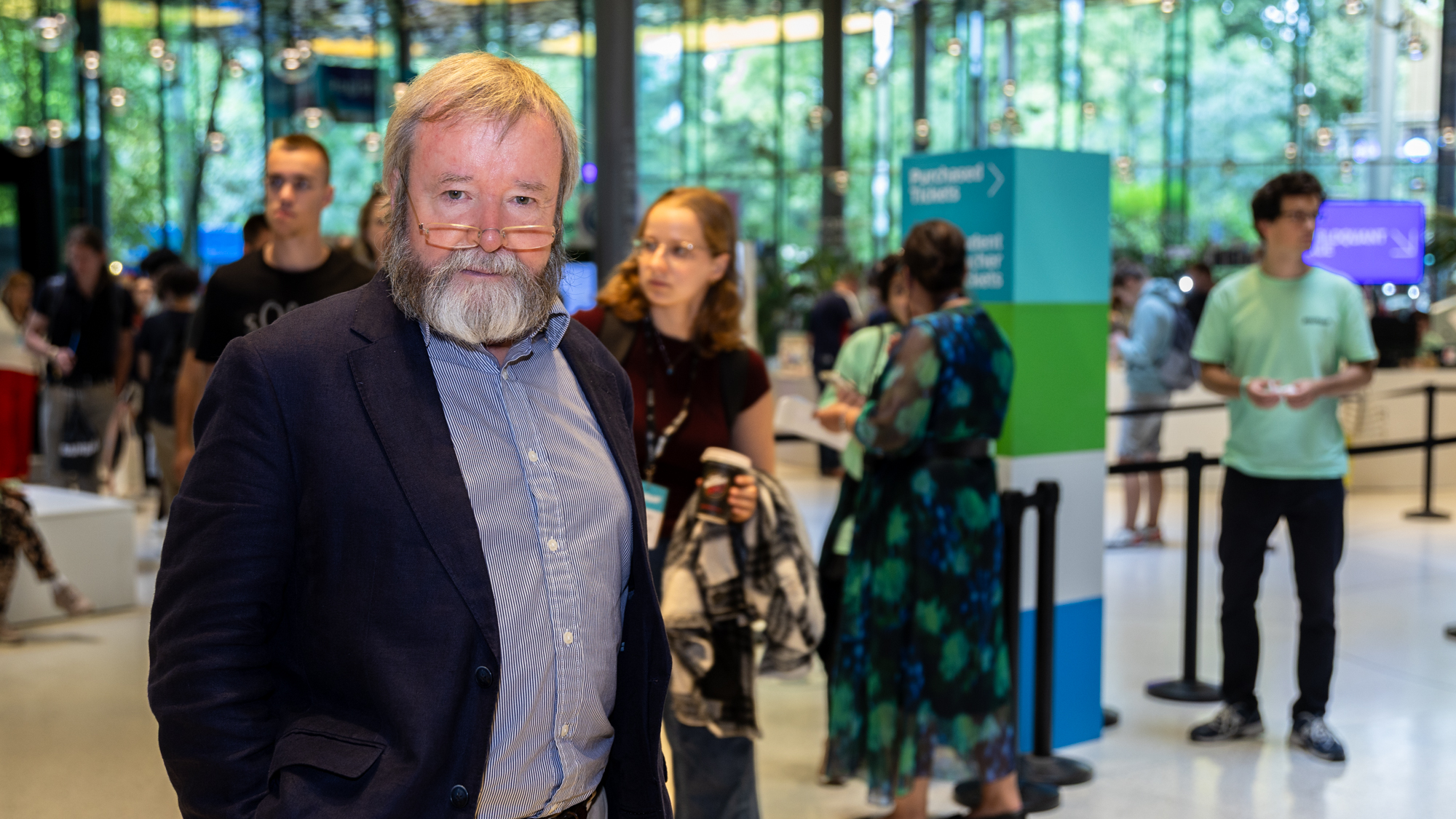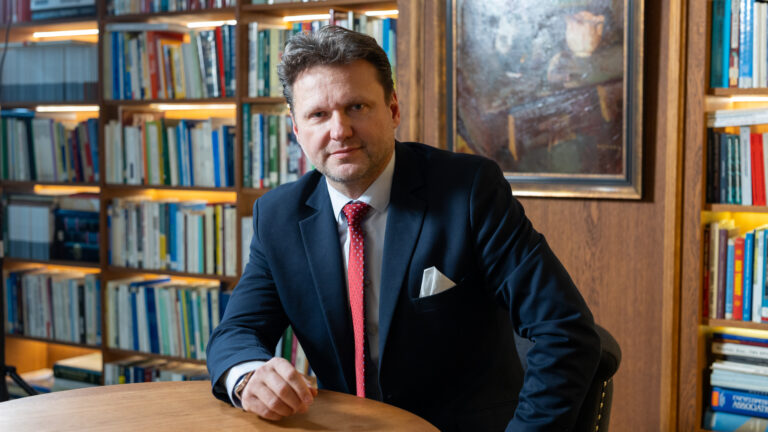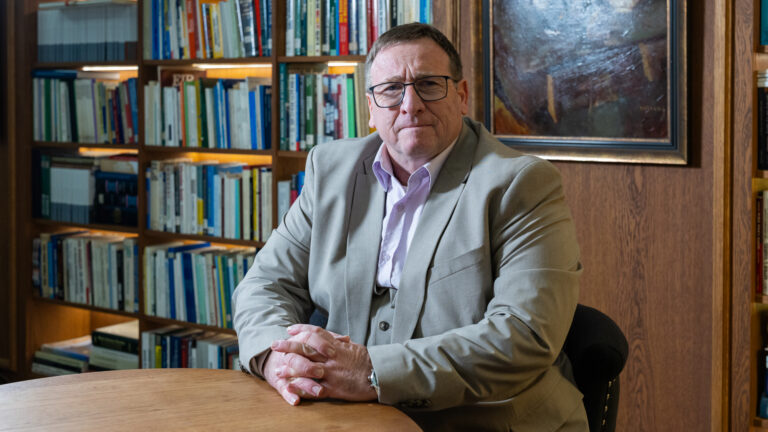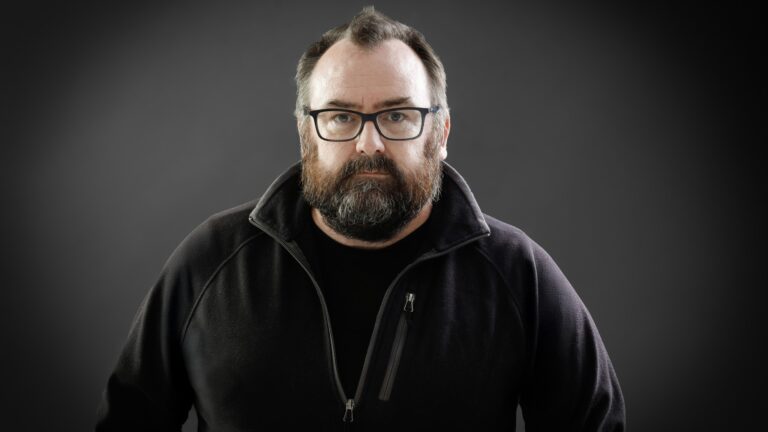Iain McGilchrist is a renowned psychiatrist, writer, and former fellow of All Souls College, Oxford, best known for his influential works The Master and His Emissary and The Matter with Things. His research explores the profound differences between the brain’s hemispheres and how these shape human thought, culture, and society. Mr McGilchrist was among the distinguished speakers at Brain Bar 2025 in Budapest. On the sidelines of the event, he sat down with Hungarian Conservative to discuss the dominance of the left-hemisphere mode of attending in Western culture, the roots of societal collapse, and the challenges posed by woke ideology and artificial intelligence.
***
In both of your main works, The Master and His Emissary and The Matter with Things, you argue that Western culture has become dominated by a left-hemisphere way of attending. Could you briefly summarize what you mean by that?
Well, first of all, I need to say that the things people used to say about hemisphere differences—they need to forget them. I’ve been researching for 35 years what the differences really are. And they are real, but they’re very different from what people used to claim. Effectively, the difference is between something that represents the world, like a scheme, a diagram or a map. A map doesn’t have much of the reality that it is mapping—it wouldn’t be very useful if it had too much information. But this vision of the world is the left hemisphere’s view, and it is able to grab things and get them. Its great advantage is that it gets stuff for us.
From an evolutionary point of view, this was because every creature has to do two incompatible things at the same time. One is to get food, for example, or to manipulate objects to build a nest or whatever. But at the same time, it has to look out for everything else—predators, its kin, its mate, its offspring, and so on. These are two different kinds of attention. One is locked onto a target that we want to grab and get, and the other is trying to understand the whole picture. That’s the right hemisphere. These two things are not strictly compatible at the same time. It takes a certain subtlety to balance them well.
This normally happens in most cultures early on in their trajectory. In Greece in the sixth century, in Rome around the year zero, and in our own culture beginning with the Renaissance, there was a moment when everything flourished because the two hemispheres were working together. But over time, it has drifted further and further towards the left hemisphere’s point of view.
Now you’re asking: what does such a society look like? It looks like one where theory is more important than learning from experience, where breaking things up into parts is considered the way to understand them, whereas I believe you only understand them as a whole. Because when you break things up into parts, they lose the relations they had with everything else. They lose the context. And it’s those relations that give meaning to the so-called parts.
It would be a world that is highly bureaucratic, in which there is no sense of the individual but only of categories of people, in which everything implicit is ignored and only what is explicit is taken note of. I believe that the really important things in life are pretty much all implicit, and when you make them explicit, they lose their meaning. It’s like explaining a joke—it’s no longer funny. You decode a poem, and it no longer works as a poem. All the things that really matter to us—music, art, architecture, religion, myth, ritual, love, sex—all these are degraded when they’re made explicit. They can’t easily be captured in language.
What are the dangers or threats when a civilization is driven towards this kind of left-hemisphere way of attending?
It begins to be very unintelligent. If you look at late Rome compared with Rome at the end of the Republic and the beginning of the Empire, it was very fine in its understanding of law, poetry, drama, and all these things. Its architecture was harmonious. But as it became more of an empire, it became massive and out of proportion. They no longer paid attention to harmony. They only paid attention to might and power, more and more power. Eventually, such a civilization collapses.
‘The left hemisphere is extreme in its views: it’s black-or-white, either-or’
I think we’re now in that situation—obsessed with power, with a commercial empire these days, and a bit of a cultural empire in which decadent Western postmodernism is supposed to be spread around the world. But what happens is that such a civilization collapses. We’ve seen it happen in Greece. It happened in Rome. And it has been happening since the 18th century, when people started to believe they could answer all questions through science. Now, I’m a great believer in science—I’m a scientist. But I don’t believe in scientism, which is the belief that everything can be captured by science. It can’t.
Could this trajectory be reversed?
I hope so, because if not, we’re lost. Whether we can or not depends on many things. There are obviously a whole range of disasters threatening us—from environmental collapse to the collapse of civil society. To reverse them, we’d have to act quickly and be deeply committed to changing the way we think. Not about the atomistic self—’me, me, me’—but about society as a whole, about our relationship with other humans, with nature, and with what I believe is the divine cosmos.
Psychological literature confirms without question that these three relationships—first, with a social group with whom you can share your life and worship and eat together; second, with the natural world, seeing yourself as part of it and aware of its beauty and complexity; and third, with the divine cosmos—these dictate whether we become happy, functioning, healthy human beings. Without them, both our mental and physical health decline. We become distressed, anxious, and rudderless.
Particularly young people have had everything taken out of their world that would give them a sense of direction and values. Many grow up thinking there are no values, no purpose. I think this is deeply wrong. I believe there is purpose, and there are values—and they are not created by us. They pre-exist us, and it is our job to respond to them. If we fail to do so, we become less than human, and society becomes less than human.
We should stop believing that humans are naturally toxic. They are not. They are naturally extraordinarily efficient, capable of wonder, capable of love. These are the things we need to recover.
Many of the points you described could equally be applied to what is commonly referred to as the so-called ‘woke’ ideology. In terms of the left- and right-hemisphere distinction, to what extent do you regard it as merely another expression of left-hemisphere dominance, or as something more complex?
Well, it’s bound to be complex. But it does fit with my view that we are now dominated by left-hemisphere thinking and have forgotten what the right hemisphere can still tell us. It’s not that the right hemisphere has disappeared—it’s just that we’re not paying attention to it.
The left hemisphere is extreme in its views: it’s black-or-white, either-or. There’s no ‘both/and’ or shades of meaning. So in public dialogue, for example on the internet, people’s views tend towards extremes. They fail to see the dark side of their own position. Recovering that balance is very important.
The left hemisphere’s vision is not compassionate. Typically, people hate and want to destroy those who don’t agree with them. This is appalling. The vision it offers is one of eternal power and survival—we can do away with our bodies, do away with death, rule everything. But unfortunately, we have almost zero wisdom with which to use this power. What we need is wisdom, not more power. Because in the current state of things, increasing our power is like putting machine guns in the hands of toddlers—we’ve not grown up mentally.
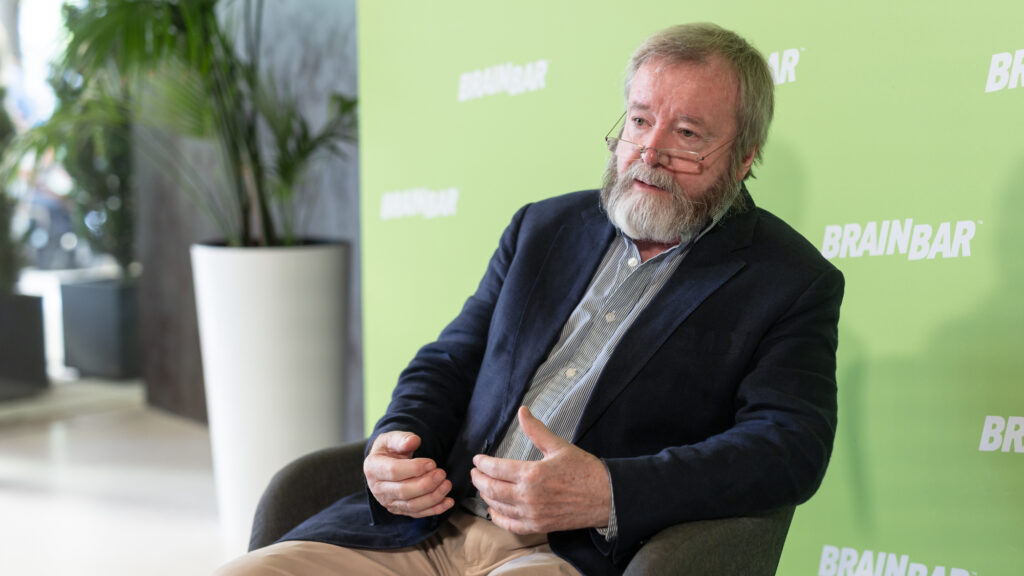
Do you consider this to be exclusively a Western phenomenon, or could it also be applied to Eastern cultures—for example, Chinese or Japanese culture?
Those countries you mentioned have a long history of a worldview much closer to that of the right hemisphere. Of course, we need both hemispheres. But the left needs to be under the supervision of the right. This used to be the case in Eastern cultures. But very sadly, during my lifetime, they’ve begun to embrace totalitarian visions that are entirely left-hemispheric.
Where we could have learned from them, they’ve taken on our way of thinking—even more extremely. However, I have hope, because I think enough people in those cultures still remember their ancient wisdoms. I’ve spoken with people in China, and I was recently in Japan. I think there will be a move to re-embrace their traditions.
What should we, as Western society, do to restore balance? For instance, in Hungary there is strong political and social resistance to woke ideology. Do you see this as a positive development, or merely as pushing to the opposite extreme?
Well, time will tell, but certainly somebody needs to push back. It would be wrong to say ‘you don’t want to hear anything about it’ because it might become extreme. When it becomes extreme, that’s the time to say no. There was nothing wrong with some of the original left-leaning ideas, which needed to be heard. But they’ve been taken, at least in my country, to an extreme where you cannot say anything against them. It’s like living in Eastern Europe as it used to be under Soviet rule—you cannot express your opinions if you want to keep your job. Most people are silenced. So it has to be pushed back against, in the interests of tolerance, fairness, justice, compassion—all of which it lacks.
One way is through education. Education has become very mechanistic. We worship STEM subjects. Of course they have a place, but in themselves they’re not an education—they are instruction in technique. Real education is about understanding the whole, with emphasis on the humanities—poetry, drama, history, philosophy. These need to be brought back, not to replace maths, science, or technology, but to give them their proper place. Much as the right hemisphere should oversee the left, so the humanities should guide the sciences.
‘Imagination is what has driven both science and art. Without it, human culture cannot flourish’
Another way is to create small communities where people live with lower material expectations, live for one another, grow their own food, and re-sacralize life. There are already some such centres in Britain, but we need more. When civilization collapses—and I don’t say it must, but it may—these places will be models for survival.
The third and most important thing is that each person has to attend to themselves. We are not asked to save the world—we can’t. But we are asked to be accountable for our own way of looking at the world. This is the project that can start today: examine your heart, adopt a different attitude, closer to that of the right hemisphere, which sees complexity, awe, and meaning beyond material value.
Given the rise of technology, social media, and artificial intelligence, how do you envisage Western culture evolving over the next 15 to 20 years?
Well, it’s notoriously difficult to predict the future. Most people who try are wrong. I can’t say with certainty, but I am very worried. Advances in AI are happening exponentially fast. Within a couple of years, there will be a strong push for everyone to carry a chip in their body. Already there are chips capable of reading thoughts directly. Such a chip would be presented as a good thing—imagine people who can’t speak. But it’s vital we oppose this, or we will all be slaves. Everything we do will be known, monitored, overridden by the state. That would be the end of humanity, a totalitarianism we could never escape.
People will say: ‘Oh, it’s so convenient. I can shop, access my bank, make appointments.’ But that’s stupidity. They also say: ‘I have nothing to hide.’ Anyone who has lived under a totalitarian regime knows it doesn’t matter—you are still under control.
I am extremely worried. This will also impact human creativity and imagination. AI does not have imagination. It has access to vast data and can recombine it, but imagination is what has driven both science and art. Without it, human culture cannot flourish.
Read more of our interviews:

